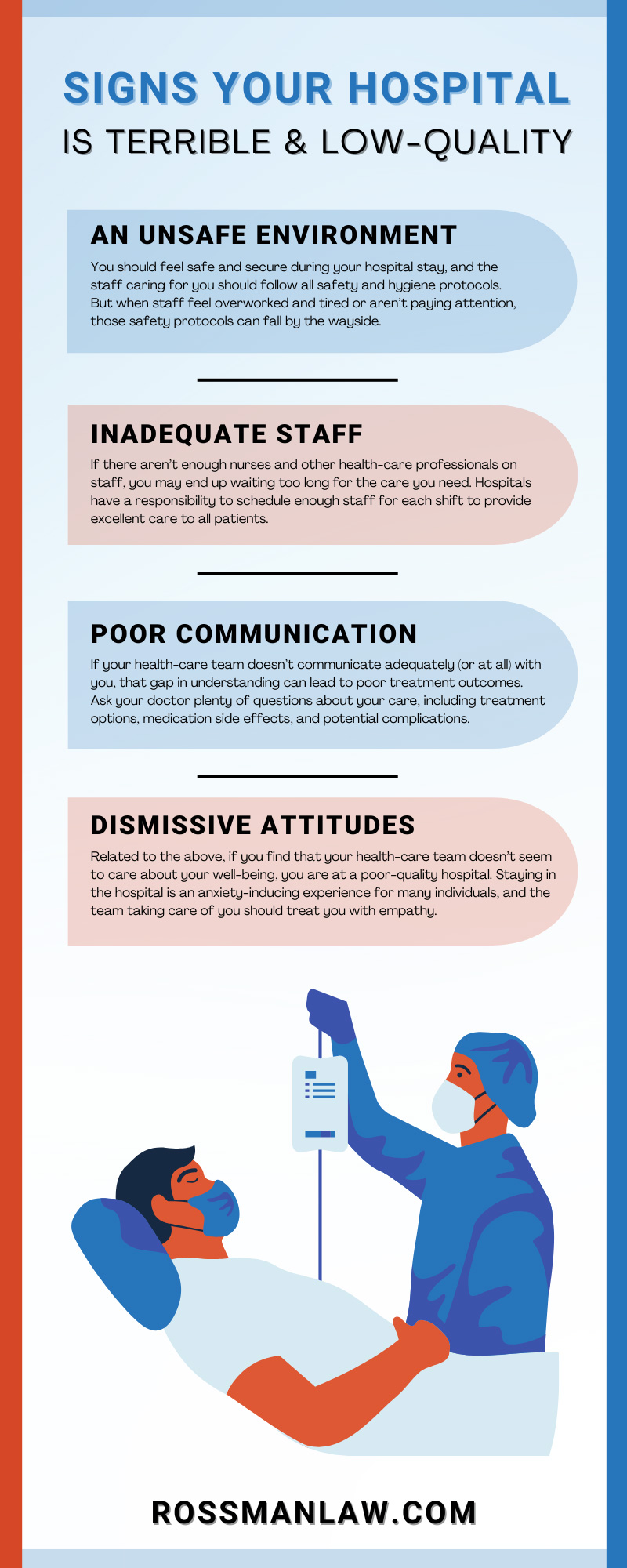
The Role of Damages in Your Personal Injury Case
August 30, 2023
Who Can You Sue for Injury on Public Transportation?
September 12, 2023The health-care industry has a responsibility to its patients to provide high-quality treatment and care during their hospital stay. Further illness or injury shouldn’t happen in a medical setting. However, the unfortunate truth is that many hospitals are poorly managed, inadequately staffed, or otherwise incapable of providing that standard of care.
How can you tell when the hospital that’s treating you is terrible and low-quality? Rossman Law Group has plenty of experience dealing with hospital negligence, and we know the signs of a third-rate facility. Advocate for yourself when you need medical care, and learn to recognize when things aren’t right.
An Unsafe Environment
You should feel safe and secure during your hospital stay, and the staff caring for you should follow all safety and hygiene protocols. But when staff feel overworked and tired or aren’t paying attention, those safety protocols can fall by the wayside.
Are there wet floors in rooms or hallways with no signage near the wet area? Have the rails on either side of your hospital bed seen better days? Hospital equipment that’s in disrepair can pose serious safety risks.
Inadequate Staff
Do you find yourself waiting for hours to receive your medication or meal or for someone to turn you in bed? If there aren’t enough nurses and other health-care professionals on staff, you may end up waiting too long for the care you need. Hospitals have a responsibility to schedule enough staff for each shift to provide excellent care to all patients.
In addition to long wait times, inadequate staffing can lead to inadequate standards of care. The nurse who provides bedside care to you may have a dozen other patients waiting for them, and they’ll likely rush through your care.
Poor Communication
When your physician discusses your condition with you, they should do so with language that’s accessible to a layperson. You may not understand all the medical jargon they use, and it’s their responsibility to ensure that you know everything you can about your treatment.
If your health-care team doesn’t communicate adequately (or at all) with you, that gap in understanding can lead to poor treatment outcomes. Ask your doctor plenty of questions about your care, including treatment options, medication side effects, and potential complications. If they balk at your questions or treat you like you wouldn’t understand, that’s a red flag of a subpar hospital.
Dismissive Attitudes
Related to the above, if you find that your health-care team doesn’t seem to care about your well-being, you are at a poor-quality hospital. Staying in the hospital is an anxiety-inducing experience for many individuals, and the team taking care of you should treat you with empathy.
If you ever feel dismissed, ignored, or belittled by the doctors and nurses caring for you, don’t be afraid to speak up. Advocate for the improvement of your health, your understanding of your condition, and your experience during your hospital stay.
Frequent Medical Errors
Medical error is an extremely common factor in medical negligence and malpractice cases. If your doctor fails to perform adequate tests, they may diagnose you incorrectly and prescribe treatment that won’t help or will worsen your condition. Likewise, if your nurse gives you the wrong pills at medication time, your condition may not improve.
High-quality hospitals have robust procedures in place to avoid medical errors and quickly correct them if they do occur. A hospital that has a “whatever” attitude toward errors in treatment is unlikely to have a positive reputation. If you suffer the consequences of an avoidable medical error during your stay, contact a hospital negligence attorney to discuss your options.
Negative Reviews and Reputation
During the course of your hospital stay, if you notice any of the red flags discussed in this guide, do some internet research on the facility. Have other patients left scathing reviews detailing their own negative experiences? The hospital may have more problems than you’ve already noticed.
In addition, researching your hospital can provide insight into any scandals or egregious malpractice surrounding the hospital. Does the facility have a history of subpar or even outright negligent care? That is one of the biggest red flags pointing toward a terrible hospital.
Poor Follow-Up Care
Before your health-care team discharges you from the hospital, they should discuss your long-term care with you. If you’ve had surgery, for example, they should talk to you about dietary requirements, pain management, and wound care. High-quality hospitals ensure appropriate follow-up care and schedule subsequent appointments as needed.
What if they send you from the hospital with minimal advice on how to recover from your illness or injury? Feeling like they’ve kicked you out without any follow-up care plan is a sure sign you’ve stayed at a bad hospital. Effective follow-up care is crucial in managing health conditions and preventing unpleasant complications.
Poor Staff Education
The health-care professionals caring for you should be just that—professionals. Do you get the feeling that your care team doesn’t know what they’re doing? Does your doctor frequently misspeak or make mistakes? Does your nurse prick your arm over and over in search of a vein for your IV?
If you get the strong sense that amateurs are caring for you, that poor standard of care can lead to equally poor health outcomes for you. That haphazard care could mean that the staff doesn’t have adequate training in their field.
When you check in the hospital for an illness or injury, you have the right to expect the best care they can provide. Health-care professionals must practice high standards of care, regardless of the patient or the condition. However, that doesn’t always happen with some hospitals, and these are the hospitals you want to avoid.
Rossman Law Group knows the signs of a terrible and low-quality hospital from years of experience. If you’ve been misdiagnosed, mistreated, or outright harmed by the health-care professionals treating you, reach out to us for a free legal consultation. We’ll listen to every detail of your story and provide reliable advice on how to move forward.






